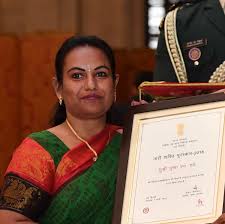On exam days in Karnataka, when silence descends upon classrooms and pens scratch across answer sheets, Pushpa NM quietly takes her seat—not as a student, but as a scribe.
For the past 17 years, the 42-year-old school assistant has been lending her hand—literally—to others. She has written 1,086 examinations for students with disabilities. All of it, she’s done free of charge.
“I write for them so they don’t have to stop dreaming,” she says in Kannada, her voice barely above a whisper.
A Pen That Speaks for Others
Pushpa’s story begins in 2007, when a local school approached her to write an exam for a visually impaired student who had no one to assist him. That single act of service slowly evolved into a mission.
Since then, Pushpa has written for students with visual, physical, and neurological impairments—from elementary school children to master’s degree candidates and civil service aspirants. She’s traveled from village schools to city colleges, sometimes taking overnight buses to reach exam centers on time. Often, she doesn’t know the students before the exam. Afterward, she quietly leaves.
Her recordkeeping is simple: a diary with names, subjects, and dates—no fanfare, no certificates.
She has never accepted a rupee.
An Unseen System of Support
India legally mandates that students with certified disabilities be provided scribes under the Rights of Persons with Disabilities Act, 2016. But in practice, there is no centralized database of trained scribes, no uniform protocol across institutions, and no honorarium for volunteers. Most families either rely on relatives, plead with teachers, or depend on the generosity of strangers.
Pushpa fills that gap. Over the years, she’s become an unofficial lifeline—someone local nonprofits and special educators call when no one else steps forward.
“She’s not just a scribe,” says Lakshmi Devraj, a disability rights worker in Mysuru. “She’s a bridge between silence and opportunity.”
A Day in the Life
On most exam days, Pushpa begins early. She leaves her job at JSS Polytechnic College, where she works as an assistant, and makes her way to the assigned center. Some exams last three hours; others, like competitive tests, stretch all day. She listens carefully as the student dictates. She writes exactly what they say. No more, no less.
Sometimes the students are nervous. Sometimes they break down mid-sentence. Pushpa waits. She calms them down. And then she continues writing.
There are moments when her hand cramps, or her own life demands attention. But she has never missed a commitment.
Recognition, If Any, Comes Later
Pushpa does not seek recognition. Still, word of her work has slowly spread—through social media posts, small newspaper profiles, and word-of-mouth among teachers and families. She has received modest local awards. But she shrugs them off.
“This isn’t social work,” she says. “This is human work.”
The Larger Failure of the System
Pushpa’s story, while inspiring, also casts a shadow: it highlights the systemic failure to support students with disabilities. India’s education system—especially in rural and semi-urban regions—offers limited infrastructure for inclusive education. While elite institutions debate AI and coding in classrooms, many disabled students are still struggling to find someone to help them write a basic test.
Volunteers like Pushpa are not the rule. They are the exception.
“There should be a government-funded registry of trained scribes. There should be protocols,” says Arjun Rao, an education researcher based in Bengaluru. “What Pushpa does is heroic. But the system shouldn’t rely on heroism.”
One More Exam to Write
Back in Mysuru, Pushpa flips through her diary. There’s an upcoming diploma exam for a blind student next week. She’s marked the date. She’s already arranged leave from work.
She has no plans to stop.
“If they’re willing to fight for their future,” she says, “the least I can do is sit beside them.”


